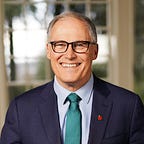Governor’s trip “down under” yields trade, climate partnership
On Nov. 2, Gov. Jay Inslee leaped over time zones on his way to Australia for a study and trade mission. Australia is 18 hours ahead of Washington state — nearly a full day. But Australia is living in the future in another way — they’re ending the dirty era of fossil fuels and embracing healthy, clean energy.
Renewable energy generation. Hydrogen-powered industry. Advanced climate policies. Australian states, the nation’s private sector, and the government of Prime Minister Anthony Albanese have welcomed clean energy. As a result, the continent “down under” is a cut above in terms of climate ambition.
The governor and state delegation’s visit aims to expand Washington and Australia’s existing billion-dollar trade relationship and accelerate the switch to clean energy. After all, states can act with greater urgency than nations to respond to the climate crisis. Washington, New South Wales, Tasmania, and Victoria are proving it.
Abundant clean energy
Rooftop solar is poised to become Australia’s largest power source. Renewable sources account for nearly 39% of the nation’s electricity, about twice the American percentage. The Australian state of Tasmania generates so much clean power, they’re planning to export some of their surplus abroad. And the Australian government recently blocked a proposed open-cut coal mine that would have endangered the Great Barrier Reef.
Throughout the trip, Inslee sat down with Australian leaders responsible for some of this progress. Victoria’s Minister for Climate Action Lily D’ambrosio recently announced a new $630 million investment to switch households from harmful methane to renewable, affordable electricity. Tasmanian Premier Jeremy Rockliff announced in March that the state was self-sufficient, powered exclusively by renewable electricity generated within its borders. The premier has also funded hydrogen innovation clusters in his state, just as Inslee has in Washington. New South Wales Premier Chris Minns recently announced a new climate change bill pledging to slash emissions by 50% by 2030 in his state, and completely by 2050. Washington state’s Climate Commitment Act charts a similar course.
“Australia, as a nation and in its states, has made incredible advances in climate policy and clean energy adoption in recent years, just like Washington,” said Inslee. “So we’re both showing the rest of the world what’s in it for them if they plug into clean energy.”
Big breakthroughs for boats, trucks and planes
The world’s largest electric ferry is under construction at the Incat Shipyard in Tasmania. The vessel is scheduled for delivery in 2025 and will carry as many as 2,100 passengers and 225 cars between Buenos Aires, Argentina and Montevideo, Uruguay. The ship is powered by Corvus Energy batteries manufactured in Bellingham, Wash.
While the ship is among the first of its kind, Incat’s leaders say it won’t be the last.
“The feedback from overseas has been extraordinarily positive. I expect that we are going to see many more battery electric ships built here at Incat in Tasmania,” says the plant’s managing director Craig Clifford.
At the VIGOR shipyard in Seattle, one of Washington state’s ferries is under construction to outfit a new hybrid-electric powertrain. The Wenatchee is the first of three of Washington State Ferries’ Jumbo-class ferries to be converted, which is just the first step of an ambitious plan to electrify the entire ferry system — the largest in the United States. The trends observed by Australian shipyard operators are echoing in America — there is demand and ecological necessity for clean transportation.
Another clean tech breakthrough shared between Australia and Washington state has come in the form of behemoth mining trucks. “Ultra”-class mining trucks carry titanic loads and operate 24/7. Trucks of this class churn 20-cylinder diesel engines. First Mode, a Seattle-based engineering firm, has developed hydrogen- and battery-based powertrains to decarbonize them. Australian customers have already retrofitted several trucks to decarbonize mining operations. Decarbonizing yields competitive advantage for these mines, as their customers demand greener supply chains.
In addition to greener boats and greener trucks, Australian airliners are keen to fly greener planes. To that end, they have made inquiries about Washington state’s new capacity to produce sustainable aviation fuel. SAF can be made from industrial byproducts, it burns cleaner than jet fuel, and it’s compatible with existing aircraft. But global supply must increase, and Washington has welcomed new manufacturers with plans to produce SAF. Representatives from Snohomish County’s Paine Field spoke with Australian customers and noted their interest in partnering on SAF.
Nurturing trade and partnership
Washington’s exports to Australia last year were valued at over $750 million. The continent is the state’s 19th-largest trading partner.
The delegation of 60 members included many representing private enterprise. First Mode is competing for grants from the Australian government that may increase their export of hydrogen propulsion systems. Boeing and aerospace suppliers met with Australian customers to expand their book of business. The sector already accounts for more than half of Washington’s exports to Australia. Microsoft announced a $3.2 billion investment in the Australian market during a recent state visit. More and more small and medium-sized enterprises are entering the Australian market.
Australians, who are very proud of their own viticulture industry, also had a chance to enjoy a showcase of Washington state wines with support from Avennia, Tirriddis, Two Vintners, Fidelitas, Alexandria Nicole and Chateau Ste Michelle.
The delegation also featured leaders from Washington state’s universities and public sector, including the Washington State Labor Council, Washington State University’s Institute for Northwest Energy Futures (INEF), the University of Washington Clean Energy Institute (CEI), and the Pacific Northwest National Laboratory (PNNL).
